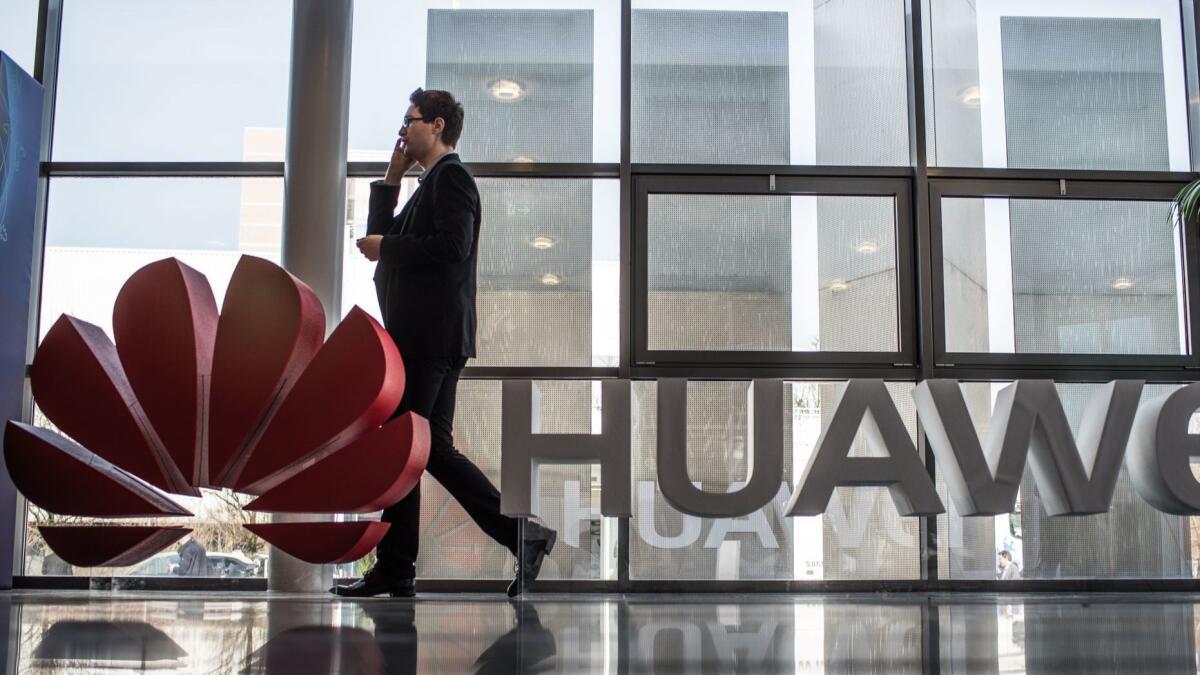Poland charges 2, including Huawei manager, with spying for China

- Share via
As Poland added to the global scrutiny of Huawei Technologies Co. on Friday with the arrest of a company employee and a local former security agent, the country’s authorities also exposed the division in Europe over policy toward the Chinese technology giant.
Huawei is facing increasing pressure across the European Union amid growing concerns that China could use the company’s equipment for spying, something executives have denied. The Trump administration has been pushing European allies to block Huawei from telecom networks amid a wider dispute over trade with China.
Although there’s little to suggest any political involvement, Poland’s government is a staunch ally of the United States and the country is a model of Trump-style nationalism and protectionism. Poland relies on the EU for money and counts on the United States for security, with U.S. troops stationed on its soil.
The dilemma is that Europe needs to develop its infrastructure somehow. Various countries, including Britain, France, Germany and Norway, have publicly raised concerns about using Huawei equipment for next-generation mobile networks. But others, such as Spain, Portugal and Hungary, have been more welcoming to Chinese involvement.
“Europe is facing a challenge when it comes to dealing with Huawei, and it shows that the continent doesn’t have the ability to be autonomous,” said Solange Ghernaouti, head of the Swiss Cybersecurity Advisory and Research Group. “Europe is either dependent on China or the U.S.”
The Huawei employee detained in Poland is a Chinese citizen responsible for sales to public sector clients, television news channel TVPInfo said Friday. The other detained man is a former high-ranking official at Poland’s Internal Security Agency who worked at mobile phone operator Orange Polska. They are to remain in custody for three months.
Evidence shows that both men conducted espionage activities against Poland, Stanislaw Zaryn, a spokesman for Poland’s secret services chief, said in a statement. If convicted, they face up to 10 years in jail, Zaryn said.
“For us, this specific investigation concerns two people,” he said later Friday. “A separate issue is that of threats in the telecommunications industry. These are two separate issues.”
China is highly concerned over the matter, its Ministry of Foreign Affairs said. “We are asking the related country to deal with the case fairly based on laws” and to protect the legitimate rights of the people, it said.
A Huawei representative said the company was looking into the matter and declined to comment further. The company said it abides by applicable laws wherever it operates and expects employees to do the same.
The Polish government named the two accused as Weijing W. and Piotr D., in line with local law prohibiting the publication of full names of those detained. Security services searched their homes and the offices of Huawei and Orange Polska, the Polish business of French mobile operator Orange. Orange spokesman Wojciech Jabczynski said the company handed over an employee’s belongings to the authorities.
The Chinese national is a former employee of the country’s consulate in the Baltic Sea port of Gdansk, according to TVPInfo television.
The accusations add to Huawei’s troubles of late as Western governments grow worried that the company’s systems could be used by Chinese intelligence.
Australia and New Zealand banned Huawei equipment from the planned 5G networks of carriers in those countries, and the head of British spy agency MI6 said last month that the British government needs to decide whether to ban the company.
Germany has said it is considering restricting Huawei’s role in its future telecom infrastructure. Czech President Milos Zeman said Friday that China is preparing an economically damaging reprisal against his country after authorities issued warnings about Huawei and risks it poses to security.
Huawei is also mired in a U.S. case alleging violations of trade sanctions. The United States alleges that its chief financial officer, Meng Wanzhou, conspired to defraud banks to cause them to unwittingly clear transactions linked to Iran. Meng — the daughter of the company’s founder — was released on bail four weeks ago in Canada and is living under restrictions in her million-dollar Vancouver home.
The company has previously said that it does not pose a security threat and that no government has ever asked it to build backdoors or interrupt any networks. It has said it would “never tolerate such behavior by any of our staff.”
“Huawei’s biggest challenge is to prove to its partners across the world that the quality of its cybersecurity services is second to none and that there’s no possibility of backdoor intrusion,” said Ghernaouti at the Swiss Cybersecurity Advisory and Research Group. “But they’ve failed to do that so far.”
More to Read
Sign up for Essential California
The most important California stories and recommendations in your inbox every morning.
You may occasionally receive promotional content from the Los Angeles Times.










